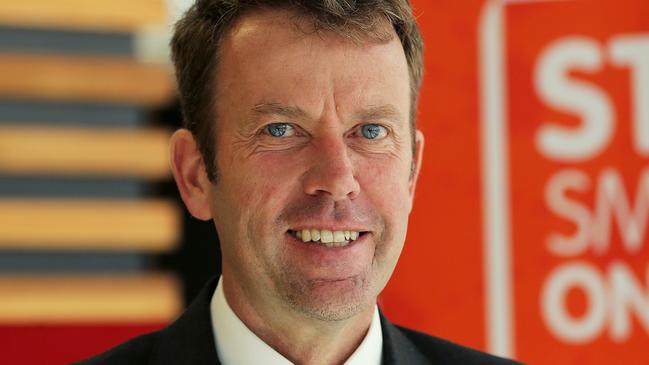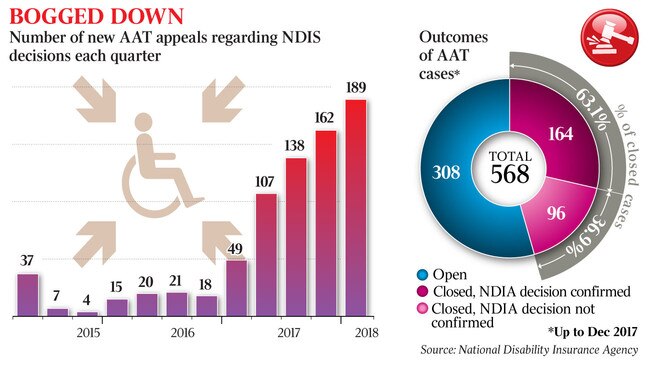NDIS legal bill hitting $10m a year
The agency running the $22bn NDIS has faced a dramatic rise in people getting more money, and trying to access the scheme.

The agency running the $22 billion National Disability Insurance Scheme is spending up to $10 million a year on barristers and legal services in a bid to arrest the dramatic rise in the number of people successfully appealing for more money in their support packages or trying to get into the scheme.
The agency has been explicit in its fears over the future of the scheme, saying the risk to its financial stability is “extreme” from unfavourable court and tribunal decisions that have the potential to “vastly increase the scope of both access and reasonable and necessary supports”.
The Australian understands the National Disability Insurance Agency, which has lost almost 40 per cent of the 260 cases resolved so far, has spent more than $6m hiring junior counsel to represent it at Administrative Appeals Tribunal hearings and on preparation for the matters.
Legal sources said yesterday the NDIA had also sent $2300-a-day barristers to informal phone hook-ups before matters were heard. The agency did not disclose its internal legal budget.
The organisation spent more than $2.6m in the 2016-17 financial year on external “legal services”, including $422,000 to the Australian Government Solicitor in an eight-month period and $133,000 to firm DLA Piper for a four-month secondment.
In its submission to the Productivity Commission review on costs in March last year, the NDIA stated “the risk exposure to the (scheme) in this respect is potentially extreme”.
“Decisions by the AAT (and/or an appeal to the Federal Court) have the potential to vastly increase the scope of both access and reasonable and necessary supports and must be adhered to while (they are) in effect, even if the NDIA challenges the decision,” the NDIA said.
The number of new appeal applications has almost tripled in the nine months to March, and in just two months this year the NDIA has been forced to revise plans for three participants by almost $200,000 a year because tribunal members found they had been underfunded.
In one case, the agency tried to deny taxi costs for quadriplegic man Peter Perosh, despite losing a separate Federal Court case and subsequent appeal about “reasonable and necessary” transport costs, which became a precedent.

The scheme was forced to triple annual transport funding for Mr Perosh to more than $7000.
Social Services Minister Dan Tehan said last night the scheme had come in under budget in each year of its operation.
“The NDIS operates on insurance principles that allow the identification of areas of potential pressure,” Mr Tehan said. “Such pressures are being actively managed to ensure that the scheme continues to operate within the designated full-scheme envelope of $22bn.”
Mr Tehan said an NDIA submission to the Productivity Commission last July had said that, over time, the definition and scope of “reasonable and necessary” would be shaped by court and tribunal decisions.
“These decisions will be critical to the future sustainability of the scheme,” he added.
Before matters can be taken to appeal, participants must go through a process of “internal review”. In its investigation report on these reviews, released on Tuesday, the Commonwealth Ombudsman said stakeholders had told its office their clients had been “effectively discouraged from exercising their right to seek an internal review of a planning decision”.
“It is true that an unscheduled plan review is not limited to the elements of the plan the participant is dissatisfied with and must consider all aspects,” the ombudsman said. “However, it seems the explanation given to participants is often perceived as a threat or discouragement rather than a helpful explanation of the process.”
The Australian spoke with several practising lawyers from firms and organisations that had dealt with the NDIA in relation to court and tribunal cases. All of them said it was apparent the agency was desperate to defend its decision-making because it had a different interpretation of the scheme legislation from the courts.
“I think it is clear they are keeping the NDIS financially on track by underpaying people because the true cost of delivering what is reasonable and necessary is always far higher than people are willing to admit,” one source said.
“If you look at the appeals, the majority are made because the scheme is denying people funding for things.”
The lawyer said that because tribunal decisions were made on a “no costs” basis there were “no ramifications for making bad or even deliberately misleading legal decisions”.
An NDIA spokeswoman said it took a conciliatory approach to all AAT matters.
“Almost 90 per cent of matters are resolved without going to hearing,” the spokeswoman said.
“The agency fully respects participants’ right to seek a review of a decision made by the NDIA under the act.”
Another lawyer said the agency was “putting the cart before the horse”. “Using the courts to constrain eligibility of the scheme is a strange, terribly uncertain and blunt way of dealing with their concerns,” he said. “I am not persuaded, given they are doing this, that they (the agency) have made a careful and actuarial analysis of the total costs of the scheme.”
Legal sources said the NDIA’s legal analysis in relation to the cases it challenged was increasingly inadequate because it frequently settled before hearings after “significant time and money and public resources” had been allocated. In some cases, lawyers have tried to persuade members of the AAT to let a client’s submission go second in order to hear where the NDIA stood on a matter.




